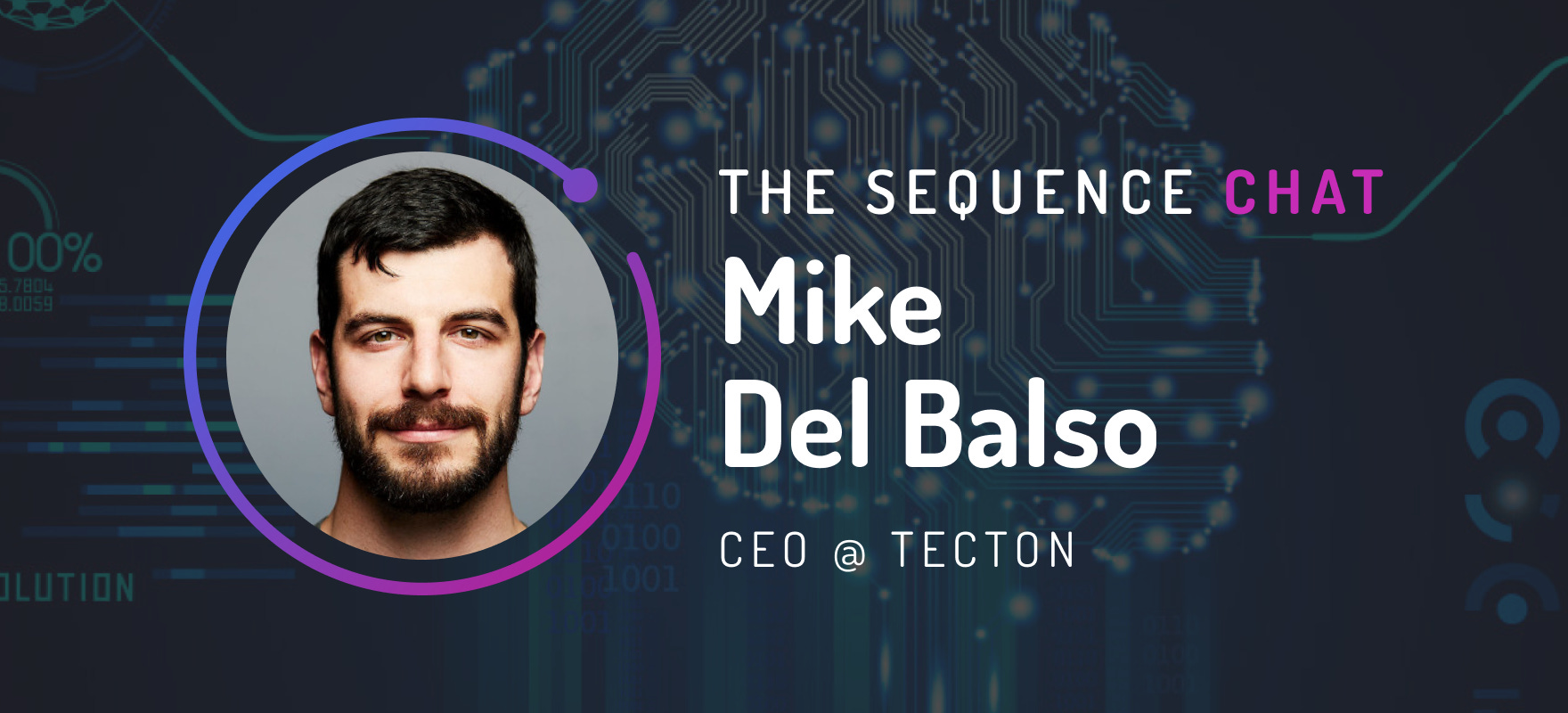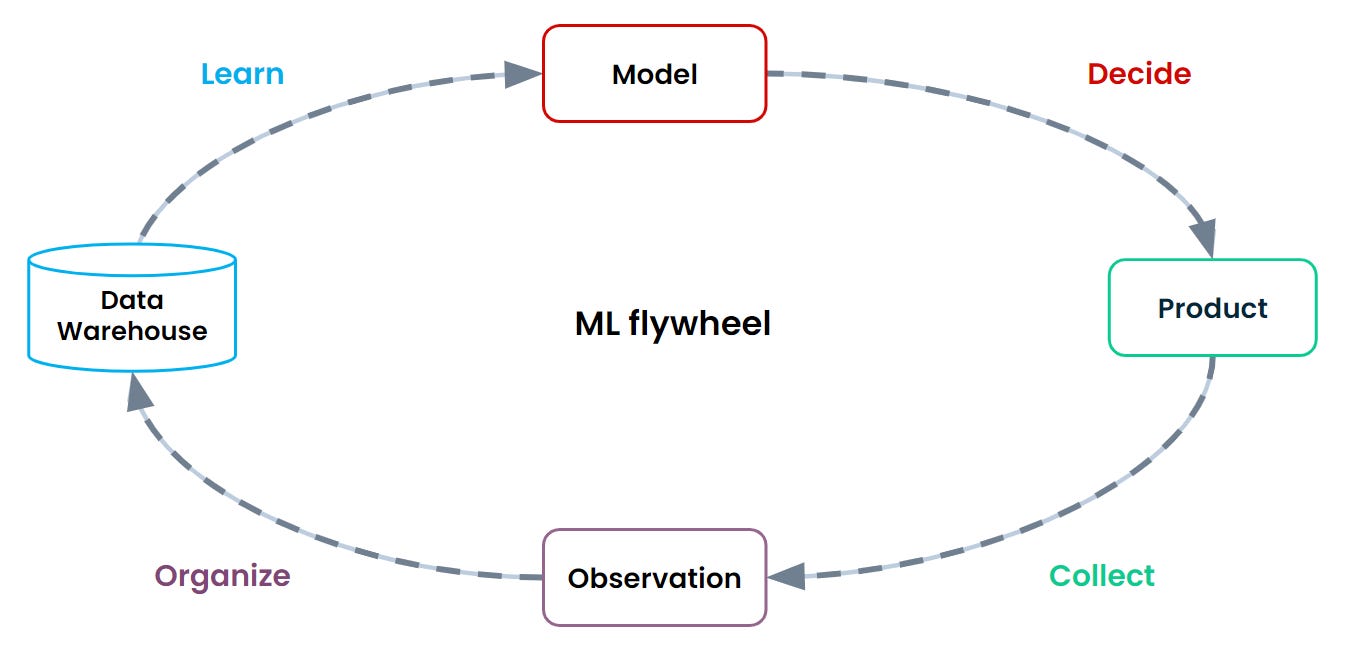🎙 Mike Del Balso/CEO of Tecton about Operational ML and ML Flywheels
Was this email forwarded to you? Sign up here It’s so inspiring to learn from practitioners and thinkers. Getting to know the experience gained by researchers, engineers, and entrepreneurs doing real ML work is an excellent source of insight and inspiration. Share this interview if you like it. No subscription is needed. 👤 Quick bio / Mike Del Balso
Mike Del Balso (MDB): I am the co-founder and CEO of Tecton, the feature platform for machine learning. Before Tecton, I led product efforts for applied machine learning at Uber and Google. I spent the last decade building systems to apply ML reliably in the real world at scale. I was the product manager for ML in Google’s ads auction, which requires first-class operational processes (now called MLOps). This same team published the well-known Machine Learning: The High Interest Credit Card of Technical Debt paper. I later helped start the ML team at Uber where we created Uber’s Michelangelo platform and helped scale ML at Uber to tens of thousands of models in production. This very applied background in ML, solving practical challenges, putting ML in production motivated the founding of Tecton. 🛠 ML Work
MDB: Before starting Michelangelo, Uber had very few models in production and most data scientists were focused on analytics. While they were eager to power live applications with machine learning, engineering teams had to build bespoke one-off systems to deploy models into production, which was a huge bottleneck. Operating a production machine learning application is a completely different beast than building prototypes, and it was almost impossible for these projects to be successful with the tools we had then. Michelangelo introduced an established path to deploying models into production. Across the company, it gave teams the tools to build, deploy and maintain operational ML applications. We were fortunate to recognize that building and managing data pipelines was the most challenging part of the ML workflow, and that became the major focus for the platform. While we knew the pain was real, we didn’t expect it to blow up in the way it did. By the time I left Uber, Michelangelo was powering thousands of operational ML applications. ML teams from other tech companies started adopting our design for their own ML platforms, and that’s when we knew there was an opportunity to solve this problem outside of Uber.
MDB: There are two different types of applied machine learning projects: analytical and operational. Analytical machine learning is when we use the results of a model to improve human decision-making. It usually powers reports and dashboards and is consumed by internal business users. Some examples of analytical ML are forecasting sales for next quarter, scoring incoming leads, or calculating a customer’s lifetime value. Operational machine learning is when an application is using ML to automatically make decisions that impact the business or customer experience in real-time. These are fully autonomous systems that must run in production. Some of the common use cases are recommendations, detecting fraudulent transactions as they occur, underwriting risk in real-time, or predicting delivery ETAs for delivery service. All the leading tech companies have invested aggressively into operational machine learning, as it is driving the competitive frontier for many consumer experiences. My co-founder wrote an article exactly on this topic: What is Operational ML.
MDB: In the FAANGs of the world, applied ML Teams are not focused on building individual models. Instead, they’re focused on designing and managing the ML application as a whole, with all the complexity of its related data flows and feedback loops. This is a very powerful paradigm shift and we call this the ML Flywheel. Great ML applications require great ML flywheels and the best ML teams have become great at building and managing these flywheels. An ML flywheel describes the full data flow loop of operational ML applications. It has four main steps:
The teams that are most successful with ML recognize that the complexity of ML is not in ideation or initial development, but in productionizing and operating these breathing, living systems. They are concerned with the entire ML flywheel. This means having a fully-connected data loop with a unified data model and clear ownership throughout. Newer generation ML infrastructure at FAANGs are focused on making ML Flywheel management possible and easy. This is the future of widely-used operational ML. At Tecton we’re helping teams build ML flywheels for their use cases. Built on top of the most advanced feature store in the industry, Tecton has an amazing foundation on which to support the full ML Flywheel.
MDB: Absolutely. At Uber, we originally invented the feature store to manage the data flows in the decide section of the flywheel. Feature stores allow teams to discover features that have already been built, and to serve those features at scale to live models. We needed to expand from there because a lot of work was still needed to continuously process raw data into features. Tecton began as a feature store but has now become a complete feature platform. It still includes a feature store as part of the product, but it now covers the learn section of the flywheel as well. We allow data scientists to define features in SQL or Python, and Tecton builds and continuously operates data pipelines in the background. Tecton is the only feature platform out there that executes transformations and orchestrates data pipelines to operate and maintain these living, breathing systems. And we’re actively building out the bottom half of the loop to log production events and seamlessly feed them back into the development process that happens at the top half of the loop. Teams that are serious about building operational machine learning are struggling with these problems and quickly adopting feature platforms. We now work with two of the top three insurance companies in the US, many of the largest banks and fintechs, leading gaming companies, popular e-commerce platforms, etc. We also work with many startups that are building innovative products centered around machine learning. Operational ML is now a topic across many industries and feature platforms like Tecton are accelerating its adoption. Whether you’re trying to prevent fraud, embed recommendations on your website, or something unique to your business, if you’re powering your product with ML, reach out to us at www.tecton.ai. Our real-time feature infrastructure helps teams avoid months or years of engineering work that’s required to support operational ML applications. 💥 Miscellaneous – a set of rapid-fire questions
MDB: The Turing test was beaten a long time ago! It just had underwhelming reactions. The next test is if AIs can speed up digital transformation efforts :)
MDB: It has been said before, but for people using data to guide their product changes, Simpson’s Paradox should be top of mind. It’s extremely practical and a good reminder to think experiment results in-depth. It also underlies some of my favorite interview questions.
All of Statistics is my favorite 101 + reference book. It gives very applied, but rock-solid first principles intuition about data and statistics, which are the core of ML. A colleague on my ML team at Google lent me this and I read every page and did every exercise. It's dense, but you won't regret any ounce of effort you put into it. You can’t be a great ML engineer unless you get the basics! You’re on the free list for TheSequence Scope and TheSequence Chat. For the full experience, become a paying subscriber to TheSequence Edge. Trusted by thousands of subscribers from the leading AI labs and universities. |
Older messages
👁 Edge#194: Masterful AI, the Training Platform for Automated Computer Vision
Thursday, May 26, 2022
On Thursdays, we do deep dives into one of the freshest research papers or technology frameworks that is worth your attention. Our goal is to keep you up to date with new developments in AI and
🧠 Why subscribe to TheSequence?
Wednesday, May 25, 2022
#1 AI Newsletter on Substack
✅ Edge#193: ML Training at Scale Recap
Tuesday, May 24, 2022
TheSequence is the best way to build and reinforce your knowledge about machine learning and AI
☁️🔁📱 The Most Important Federated Learning Framework
Sunday, May 22, 2022
Weekly news digest curated by the industry insiders
📝 Guest post: Fast Access to Feature Data for AI Applications with Hopsworks*
Friday, May 20, 2022
how to abstract away the complexity of a dual storage system
You Might Also Like
Import AI 399: 1,000 samples to make a reasoning model; DeepSeek proliferation; Apple's self-driving car simulator
Friday, February 14, 2025
What came before the golem? ͏ ͏ ͏ ͏ ͏ ͏ ͏ ͏ ͏ ͏ ͏ ͏ ͏ ͏ ͏ ͏ ͏ ͏ ͏ ͏ ͏ ͏ ͏ ͏ ͏ ͏ ͏ ͏ ͏ ͏ ͏ ͏ ͏ ͏ ͏ ͏ ͏ ͏ ͏ ͏ ͏ ͏ ͏ ͏ ͏ ͏ ͏ ͏ ͏ ͏ ͏ ͏ ͏ ͏ ͏ ͏ ͏ ͏ ͏ ͏ ͏ ͏ ͏ ͏ ͏ ͏ ͏ ͏ ͏ ͏ ͏ ͏ ͏ ͏ ͏ ͏ ͏ ͏ ͏ ͏ ͏ ͏ ͏ ͏ ͏ ͏ ͏
Defining Your Paranoia Level: Navigating Change Without the Overkill
Friday, February 14, 2025
We've all been there: trying to learn something new, only to find our old habits holding us back. We discussed today how our gut feelings about solving problems can sometimes be our own worst enemy
5 ways AI can help with taxes 🪄
Friday, February 14, 2025
Remotely control an iPhone; 💸 50+ early Presidents' Day deals -- ZDNET ZDNET Tech Today - US February 10, 2025 5 ways AI can help you with your taxes (and what not to use it for) 5 ways AI can help
Recurring Automations + Secret Updates
Friday, February 14, 2025
Smarter automations, better templates, and hidden updates to explore 👀 ͏ ͏ ͏ ͏ ͏ ͏ ͏ ͏ ͏ ͏ ͏ ͏ ͏ ͏ ͏ ͏ ͏ ͏ ͏ ͏ ͏ ͏ ͏ ͏ ͏ ͏ ͏ ͏ ͏ ͏ ͏ ͏ ͏ ͏ ͏ ͏ ͏ ͏ ͏ ͏ ͏ ͏ ͏ ͏ ͏ ͏ ͏ ͏ ͏ ͏ ͏ ͏ ͏ ͏ ͏ ͏ ͏ ͏ ͏ ͏ ͏ ͏ ͏ ͏ ͏
The First Provable AI-Proof Game: Introducing Butterfly Wings 4
Friday, February 14, 2025
Top Tech Content sent at Noon! Boost Your Article on HackerNoon for $159.99! Read this email in your browser How are you, @newsletterest1? undefined The Market Today #01 Instagram (Meta) 714.52 -0.32%
GCP Newsletter #437
Friday, February 14, 2025
Welcome to issue #437 February 10th, 2025 News BigQuery Cloud Marketplace Official Blog Partners BigQuery datasets now available on Google Cloud Marketplace - Google Cloud Marketplace now offers
Charted | The 1%'s Share of U.S. Wealth Over Time (1989-2024) 💰
Friday, February 14, 2025
Discover how the share of US wealth held by the top 1% has evolved from 1989 to 2024 in this infographic. View Online | Subscribe | Download Our App Download our app to see thousands of new charts from
The Great Social Media Diaspora & Tapestry is here
Friday, February 14, 2025
Apple introduces new app called 'Apple Invites', The Iconfactory launches Tapestry, beyond the traditional portfolio, and more in this week's issue of Creativerly. Creativerly The Great
Daily Coding Problem: Problem #1689 [Medium]
Friday, February 14, 2025
Daily Coding Problem Good morning! Here's your coding interview problem for today. This problem was asked by Google. Given a linked list, sort it in O(n log n) time and constant space. For example,
📧 Stop Conflating CQRS and MediatR
Friday, February 14, 2025
Stop Conflating CQRS and MediatR Read on: my website / Read time: 4 minutes The .NET Weekly is brought to you by: Step right up to the Generative AI Use Cases Repository! See how MongoDB powers your




